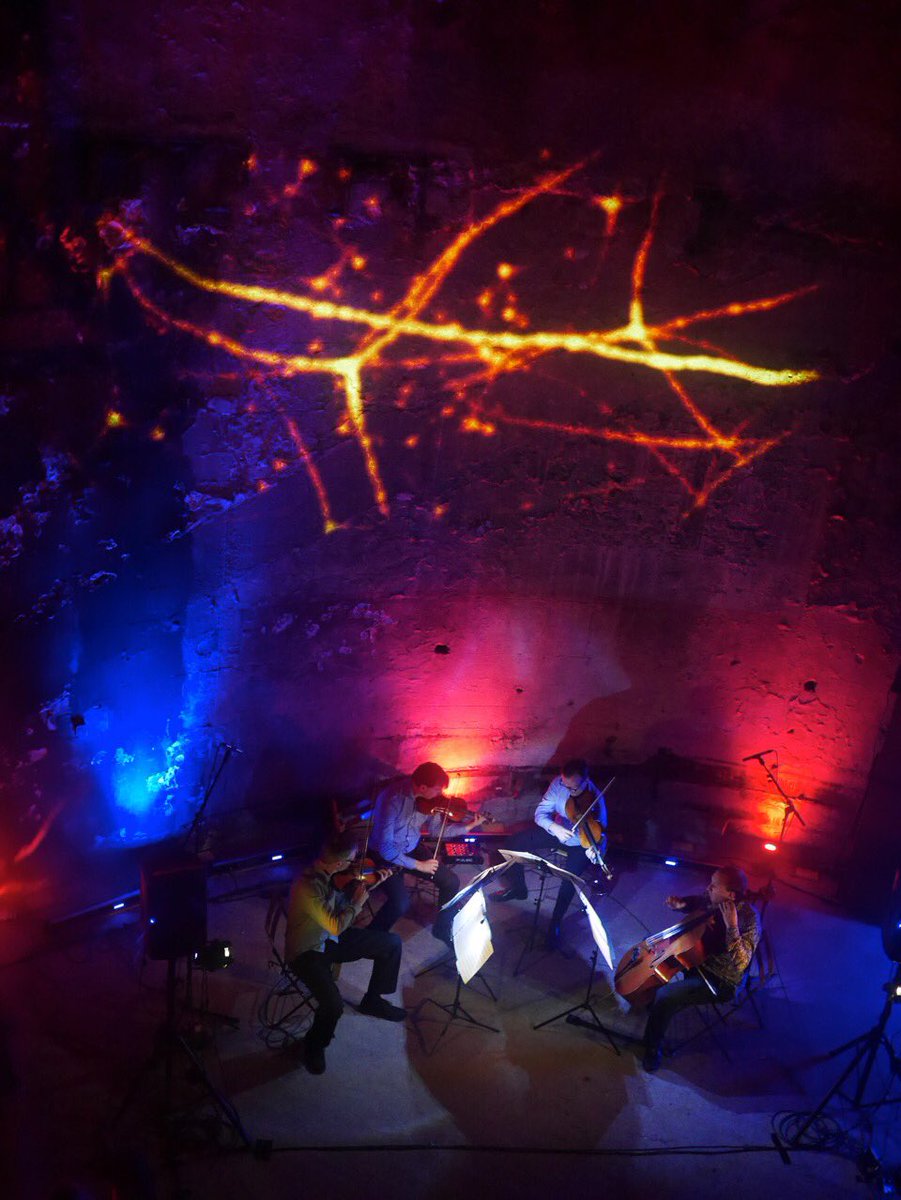Modulus Quartet, Brunel Museum, Rotherhithe | reviews, news & interviews
Modulus Quartet, Brunel Museum, Rotherhithe
Modulus Quartet, Brunel Museum, Rotherhithe
From the human to the cosmic, new works for strings in an atmospheric setting

"Total immersion", the term used for the BBC Symphony's one-composer days, takes on a whole new meaning in the Thames Tunnel Shaft now transformed – but fortunately not subject to makeover – under the mantle of Rotherhithe's Brunel Museum.
The ambitious peripherals weren't perfect; technical rehearsal had been curtailed. We lost the speakers' words at times, and the light changes from blue to purple and green didn't have much correspondence with the music. I'm still not sure that the senses can take in both serious sound and attention-grabbing vision; the receptors needed for each are quite different. If anything Tom Brown's play of shapes was more dynamic than the new-ageism it accompanied, Eliot Lloyd Short's The Golden Road Suite, too close to stone-age Minimalism for my taste.
Yet that was the only work which didn't challenge or shift with sufficient interest. Terry Davies, in transforming three movements from his music for Matthew Bourne's company as Without Quartet, was one of two composers on the programme to use the different voices of the string quartet and their interplay most beguilingly, with special attention going to the rich, resonant sound – helped unquestionably by the curved wall behind – of Mircea Belei 's viola. I was amazed to learn that the only amplification was for the two pieces with soundtrack/loop.
 Davies' work was perfectly proportioned, not a minute too long. That was also true of Ash Madni's Clarity from fragmented memories, fusing western quartet techniques with stylised ragas and imitations of the sarod and sitar in what came over as a dance suite with reflective interludes and a peaceful epilogue. It made for a fine twinning with Richard Norris's Bombay Nights, more complex in its evocative pre-recorded city soundscape than in the quartet's input, but a fascinating dialogue, all the same. The film this time was placed to the side, wise because its limited run on a loop wasn't synchronised with the music.
Davies' work was perfectly proportioned, not a minute too long. That was also true of Ash Madni's Clarity from fragmented memories, fusing western quartet techniques with stylised ragas and imitations of the sarod and sitar in what came over as a dance suite with reflective interludes and a peaceful epilogue. It made for a fine twinning with Richard Norris's Bombay Nights, more complex in its evocative pre-recorded city soundscape than in the quartet's input, but a fascinating dialogue, all the same. The film this time was placed to the side, wise because its limited run on a loop wasn't synchronised with the music.
The Modulus four's visceral drive gave way to more sustained concentration in Finnish composer Veera Lummi's 12 Seconds of Light, a piece which sounded as if it was going to be stuck in a high mesh of familiar quartet atmosphere but which evolved hauntingly to descend to a middle-range confrontation of resonant sounds before climbing back up to where it started.
Lummi's work, too, formed the first part of another good pair, this time of "becomings", with the fascinating experiment to end the programme, Matthew Slater's Memoria Technica. This was another trio of movements which like Davies' knew exactly where it was heading – in this case, surprisingly, towards the players' physical desertion of their posts as their looped selves faded into infinity like the women's chorus at the end of Holst's The Planets. And those apocalyptic rumbles from the Overground Line trains in the tunnel beyond were there to the last to add evocative commentary.
rating
Explore topics
Share this article
The future of Arts Journalism
You can stop theartsdesk.com closing!
We urgently need financing to survive. Our fundraising drive has thus far raised £49,000 but we need to reach £100,000 or we will be forced to close. Please contribute here: https://gofund.me/c3f6033d
And if you can forward this information to anyone who might assist, we’d be grateful.

Subscribe to theartsdesk.com
Thank you for continuing to read our work on theartsdesk.com. For unlimited access to every article in its entirety, including our archive of more than 15,000 pieces, we're asking for £5 per month or £40 per year. We feel it's a very good deal, and hope you do too.
To take a subscription now simply click here.
And if you're looking for that extra gift for a friend or family member, why not treat them to a theartsdesk.com gift subscription?

Add comment